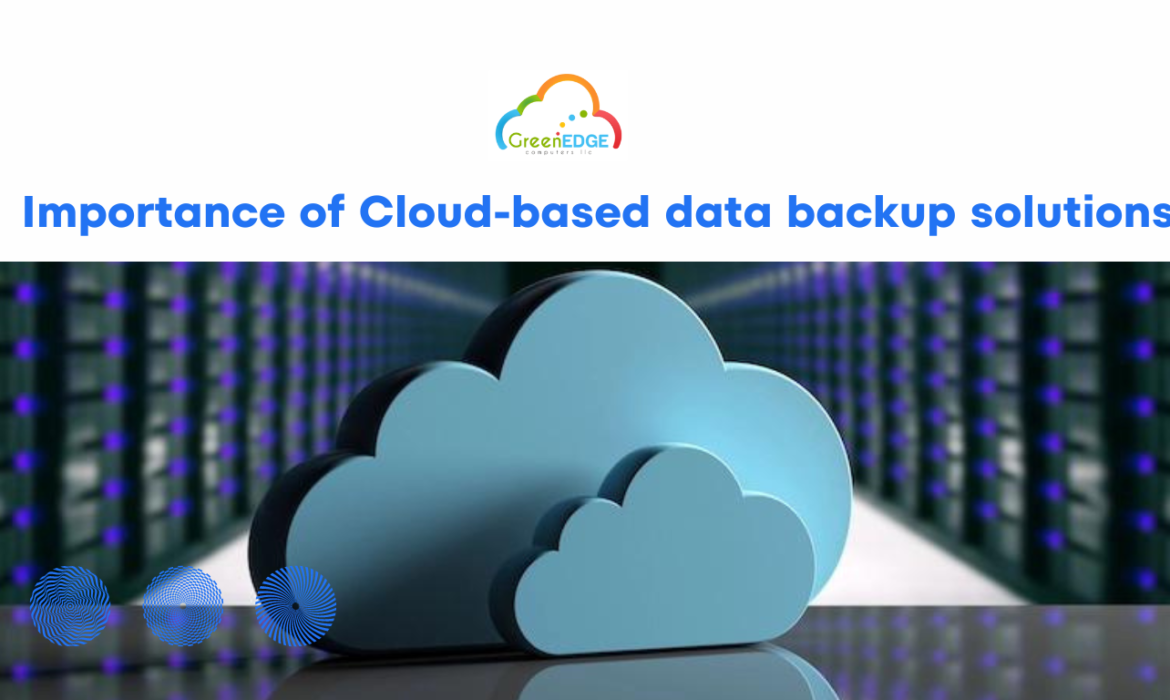Importance of Cloud-based data backup solutions
Cloud-based data backup solutions: The loss of data can happen at any moment, at any scale. It could be as innocent as unwittingly placing your laptop or another electronic device, on a magnet and destroying your device’s system, or as serious as a bad climatic cause spark off an electricity surge and taking data stored on an on-premise backup with it. This is where cloud backup comes in—data stored off-site, securely at a reliable place.
By using cloud backup, IT teams can send copies of their data via the cloud to a different place. If data is secured safely, they can restore information uninterrupted while ensuring business continuity—effectively preventing a major IT crisis. However, data security and compliance become even more effective with cloud backup, given that cloud-based data is more vulnerable to cyber-attacks. The accountability of carry-on compliance is handed over to cloud backup vendors.
In spite of some security concerns, cloud backup adoption has increased in the previous years, owing to its cost savings and recovery features. On the basis of our latest survey, 48% of data center backup users were already backing up to the cloud, and an additional 33% were thinking of doing so.
Cloud-based data backup solutions is more than just an economic way to store and save data! There are some reasons why cloud backup is so necessary for IT teams to adopt.
Cloud backup is necessary because of its:-
Dynamic
Cloud backup includes certain qualities such as data syncing, data mirroring, instant restore, and many others that are not options with on-premise backup. Due to the competitive world, cloud backup solutions are always launching improvements to the process, which IT teams may not have time to research and implement themselves.
Moreover, as raw data is stored in the cloud, it is accessible from any location in the world. This suggests that data access for your team is greatly improved, allowing team members to acquire data while working remotely. This may be difficult in times of disaster. Potential setoff, though, is that if you don’t have internet access, you can’t acquire your data.
Cloud backup solutions allow operators to access their data from any device and recover their data from any electronic device. Such as Laptop, computer, mobile.
Fast Data Restoration:
Businesses rely on electronic data from payroll to human resource development and other necessary documents. Online backup and recovery services allow you to recover data in a little time. Cloud backups are incremental, meaning many of your projects, business goals blueprint, files, and tasks will be stored and available. If you edit and after that you regret it, you can easily go back and access your files unchanged.
High technology:
Cloud-based solutions are founded on the most advanced technologies available for a business or a user. Cloud features file syncing, data mirroring, multi-layered authentication, etc. Provide tools unavailable in a traditional onsite solution. Moreover, cloud providers update their technology from time to time to keep up with the expansion in IT software.
The various Risks of Data Loss
Digital information is growing and businesses face challenges to protect their data and their client’s data. Data backup can help businesses to ensure their data is accessible whenever they need it. Most hackers and cyber-criminals use ransomware technologies that completely freeze the user’s systems by encrypting their data until they pay extortion. Cloud backups allow a user to reboot your systems without losing necessary business data.
Hackers gain access to data in various ways. Here are three things you can do to avoid cyber attacks
- Creating complex passwords/pin/ code that is hard to guess
- Establishing appropriate firewalls
- Using servers with strong security
Types of Data Loss
Approximately 23% of companies who experienced data loss from outages stated it cost them anywhere between $60,000 and $ 6million.
Here are some causes for data loss:
- Viruses
- Corrupt software
- Human error
- Corrupt software
- Hard drive damage
- viruses and malware
- natural disasters
Conclusion
Productivity can come to a standstill. It often creates a downward cycle of losing credibility to losing clients, losing productivity to losing efficiency. Even if your company recovers from all the issues it takes a lot of time to create a bond with your clients/customers.
With the features discovered above, it’s clear that the most beneficial is peace of mind. Knowing your data is secure and available when and where you need it provides a sense of comfort that allows you to consider improving and increasing your business.
Online backup and recovery solutions protect business-critical data from natural disasters, human error, Corrupt software, equipment failures, virus attacks, and many other business disruptions. It is vital to consider these solutions to protect your user’s data.
Want to know more about how backup works and how it differs from recovery? Contact us at GreenEdge Computers.
What is Data Backup and Recovery and how Datto can help?
Backup and recovery outline the process of creating and storing copies of business data that can be used to protect companies against data loss. It is sometimes known as operational recovery. Recovery from a backup is a process of restoring the data to the original location. Apart from that in this process, the data is stored in an alternate location where it can be used in case the data is lost or damaged. In this process, a data backup copy is collected in a separate system in the form of tape, from the primary data. It is done to protect the important data against the possibility of accidental any kind of data loss.
Why Backup and Recovery is important?
The goal of the backup is to generate a copy of data that can easily be recovered in case of any primary data failure. Primary data failures can be caused by hardware or software failures, data corruption, or any human-caused event, like a malicious attack (virus or malware), or any kind of accidental deletion of data. Backup copies let data be restored to support the business recovery from an unplanned data deletion situation.
Having a copy of the data on a separate medium is important to guard the data against primary data loss or corruption. This additional medium can be any external drive or USB stick, disk storage, or cloud storage.
Retaining many copies of data gives the insurance and flexibility to restore to a point in time. It helps businesses not to get affected by data corruption or malicious attacks.
Best Data Recovery Solution:
Datto is the best provider of backup, disaster recovery (BDR), and business continuity solutions. It is targeted at the small to medium business market. Datto data recovery solutions are designed around the hybrid cloud platform, which is the most reliable and efficient method for end-users to back up the business data securely. Datto and ensure the data recovery regardless of any disaster situation.
Benefits of Hybrid Cloud Backup
1. Business Continuity
The sought benefit of most hybrid cloud backup solutions is the ability to deliver business continuity. Business continuity is a proactive approach to looking at disaster preparation. If you will have the proper tools and procedures, businesses will remain functional in case of any disaster scenario.
2. Data Insurance
The hybrid cloud backup process creates a local backup locally. After that, a backup of the backup is replicated off-site. This data backup provides a great deal of data security.
3. Local Storage Flexibility
Another benefit of hybrid cloud solutions is that the complete backup is not entirely housed on-site. Businesses can leverage the “infinite” storage space of the cloud, to decide how long they want their local retention to be. Apart from that, they can scale it according to their needs. You can restore the data easily whether it is on-site or off-site. Hence businesses do not need to worry about the loss of on-demand access to their data.
4. Cost Benefits of Hybrid Clouds
• Hardware acquisition, ownership, development, and implementation costs lead to large financial investments.
• Expenses and manpower costs required to maintain the solution can add up fast.
Hybrid clouds keep costs down:
• Initial investments are low.
° End-users/MSP don’t need to own all of the essential pieces of the puzzle.
° e.g. Datto only requires the local unit to be purchased, while the rest of the infrastructure lies in the proprietary Datto cloud.
• No costly maintenance is required by the MSP.
° Decreased power, cooling, and physical maintenance costs.
• Low monthly service fees/licensing costs.
° Cover the cost of leveraging the cloud, software agents, and services outlined in SLAs.
5. Standards Compliance
For some businesses, it is important to keep specific data backed up to comply with government-regulated standards.
Backup vendors are conscious of these severe regulations. They have built their clouds to meet the requirements of these verticals. The hybrid cloud platform lends itself perfectly because if a local backup device is decommissioned all files are already located off-site and can be accessed easily when necessary. It meets many requirements for contingency plans in emergency scenarios.



